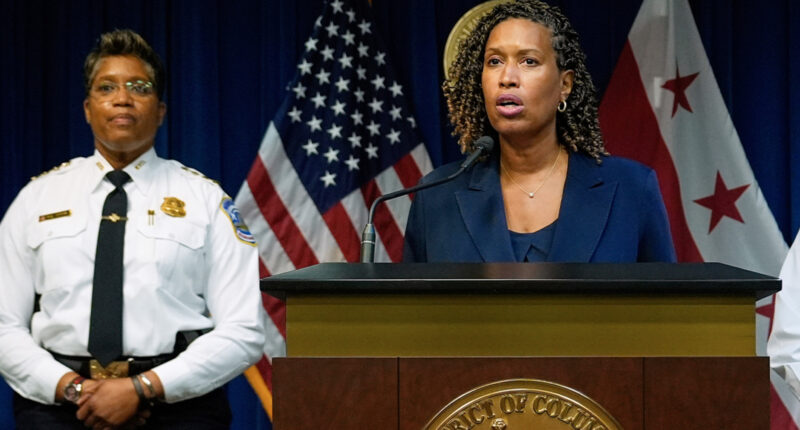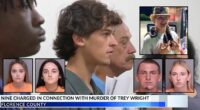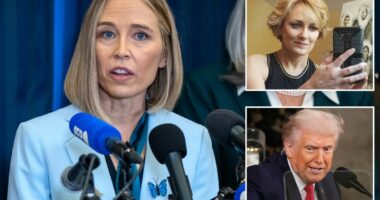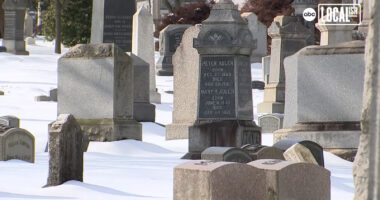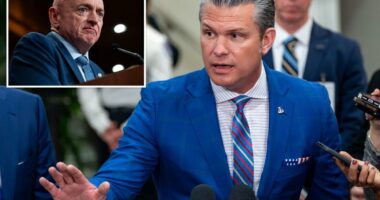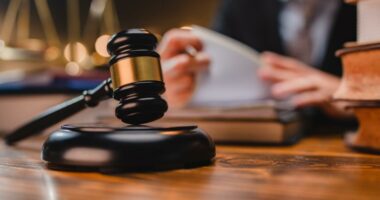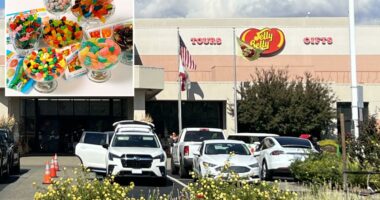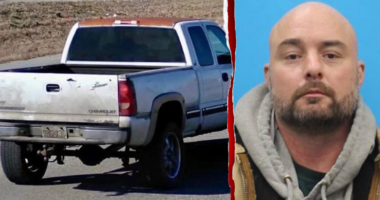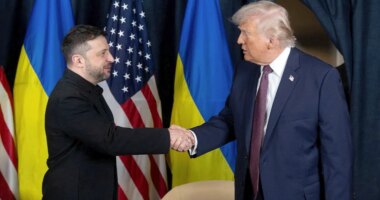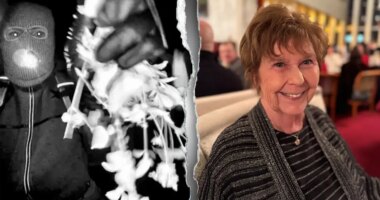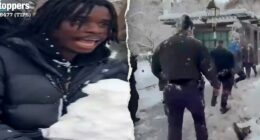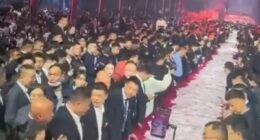Share this @internewscast.com
Amid President Donald Trump’s portrayal of Washington, D.C. as a crime-infested area requiring federal action and his threats to implement similar measures in other cities led by Black mayors, these city leaders began to confer with one another.
Contrary to the president’s statements, these mayors had observed declines in violent crime rates following an initial increase during the pandemic. This reduction was largely attributed to greater youth involvement, gun buyback efforts, and community collaborations.
Mayors from the African American Mayors Association are now intent on preventing Trump from undermining the successes they believe haven’t been properly acknowledged. They are leveraging the federal law enforcement actions in the nation’s capital to refute his claims about America’s major urban areas.
“This situation provides a platform for us to amplify our voices and challenge the notion that crime is rampant across major U.S. cities. The facts don’t support this narrative,” stated Van Johnson, Savannah’s mayor and president of the African American Mayors Association.
After initiating the deployment of 800 National Guard troops to Washington, D.C., the president aims to target other cities such as Baltimore, Chicago, Los Angeles, and Oakland, labeling them as mismanaged and crime-plagued. A commonality among these cities is their leadership by Black mayors.
“All members in our association were acutely aware that the mayors in question were Black or seen as Democrats,” Johnson remarked. “Regrettably, this seems to play a role, but as mayors, we engage with everyone, regardless of affiliation.”
The federal government’s actions have heightened some of the mayors’ desires to champion the strategies used to help make their cities safer.
Some places are seeing dramatic drops in crime rates
Trump argued that federal law enforcement had to step in after a prominent employee of the Department of Government Efficiency, or DOGE, was attacked in an attempted carjacking. He also pointed to homeless encampments, graffiti and potholes as evidence of Washington “getting worse.”
However statistics published by Washington’s Metropolitan Police contradict the president and show violent crime has dropped there since a post-pandemic peak in 2023.
Chicago Mayor Brandon Johnson scoffed at Trump’s remarks, hailing the city’s “historic progress driving down homicides by more than 30% and shootings by almost 40% in the last year alone.”
Mayor Karen Bass of Los Angeles, where homicides fell 14% between 2023 and 2024, called the federal takeover nothing but a performative “power grab.”
In Baltimore, officials say they have seen historic decreases in homicides and nonfatal shootings this year, and those have been on the decline since 2022, according to the city’s public safety data dashboard. Carjackings were down 20% in 2023, and other major crimes fell in 2024. Only burglaries have climbed slightly.
The lower crime rates are attributed to tackling violence with a “public health” approach, city officials say. In 2021, under Mayor Brandon Scott, Baltimore created a Comprehensive Violence Prevention Plan that called for more investment in community violence intervention, more services for crime victims and other initiatives.
Scott accused Trump of exploiting crime as a “wedge issue and dog whistle” rather than caring about curbing violence.
“He has actively undermined efforts that are making a difference saving lives in cities across the country in favor of militarized policing of Black communities,” Scott said via email.
The Democratic mayor pointed out that the Justice Department has slashed over $1 million in funding this year that would have gone toward community anti-violence measures. He vowed to keep on making headway, regardless.
“We will continue to closely work with our regional federal law enforcement agencies, who have been great partners, and will do everything in our power to continue the progress despite the roadblocks this administration attempts to implement,” Scott said.
Community organizations help curb violence
Just last week Oakland officials touted significant decreases in crime in the first half of this year compared with the same period in 2024, including a 21% drop in homicides and a 29% decrease in all violent crime, according to the midyear report by the Major Cities Chiefs Association. Officials credited collaborations with community organizations and crisis response services through the city’s Department of Violence Prevention, established in 2017.
“These results show that we’re on the right track,” Mayor Barbara Lee said at a news conference. “We’re going to keep building on this progress with the same comprehensive approach that got us here.”
After Trump gave his assessment of Oakland last week, she rejected it as “fearmongering.”
Social justice advocates agree that crime has gone down and say Trump is perpetuating exaggerated perceptions that have long plagued Oakland.
Nicole Lee, executive director of Urban Peace Movement, an Oakland-based organization that focuses on empowering communities of color and young people through initiatives such as leadership training and assistance to victims of gun violence, said much credit for the gains on lower crime rates is due to community groups.
“We really want to acknowledge all of the hard work that our network of community partners and community organizations have been doing over the past couple of years coming out of the pandemic to really create real community safety,” Lee said. “The things we are doing are working.”
She worries that an intervention by military forces would undermine that progress.
“It creates kind of an environment of fear in our community,” Lee said.
Patrols and youth curfews
In Washington, agents from multiple federal agencies, National Guard members and even the United States Park Police have been seen performing law enforcement duties from patrolling the National Mall to questioning people parked illegally.
Pentagon press secretary Kingsley Wilson said the guard troops will not be armed but declined to elaborate on their assignments to safety patrols and beautification efforts.
Savannah’s Johnson said he is all for partnering with the federal government, but troops on city streets is not what he envisioned. Instead, cities need federal assistance for things like multistate investigation and fighting problems such as gun trafficking, and cybercrimes.
“I’m a former law enforcement officer. There is a different skill set that is used for municipal law enforcement agencies than the military,” Johnson said.
There has also been speculation that federal intervention could entail curfews for young people.
But that would do more harm, Nicole Lee said, disproportionately affecting young people of color and wrongfully assuming that youths are the main instigators of violence.
“If you’re a young person, basically you can be cited, criminalized, simply for being outside after certain hours,” Lee said. “Not only does that not solve anything in regard to violence and crime, it puts young people in the crosshairs of the criminal justice system.”
A game of wait-and-see
For now, Johnson said, the mayors are watching their counterpart in Washington, Muriel Bowser, closely to see how she navigates the unprecedented federal intervention. She has been walking a fine line between critiquing and cooperating since Trump’s takeover, but things ramped up Friday when officials sued to try to block the takeover.
Johnson praised Bowser for carrying on with dignity and grace.
“Black mayors are resilient. We are intrinsically children of struggle,” Johnson said. “We learn to adapt quickly, and I believe that we will and we are.”
Copyright © 2025 by The Associated Press. All Rights Reserved.
